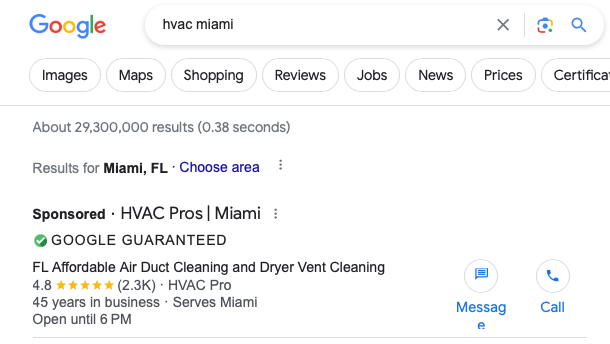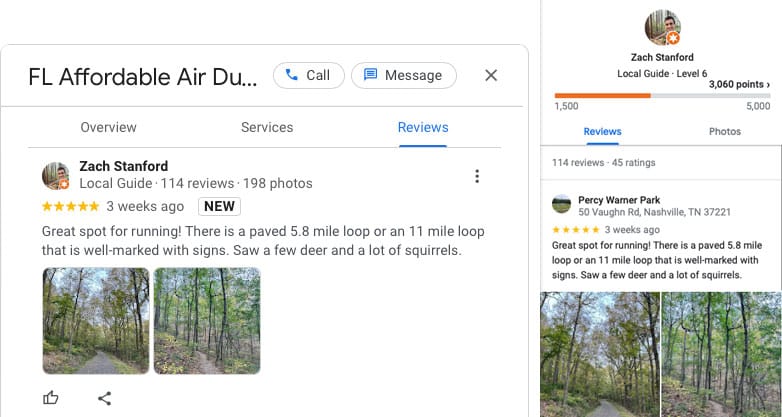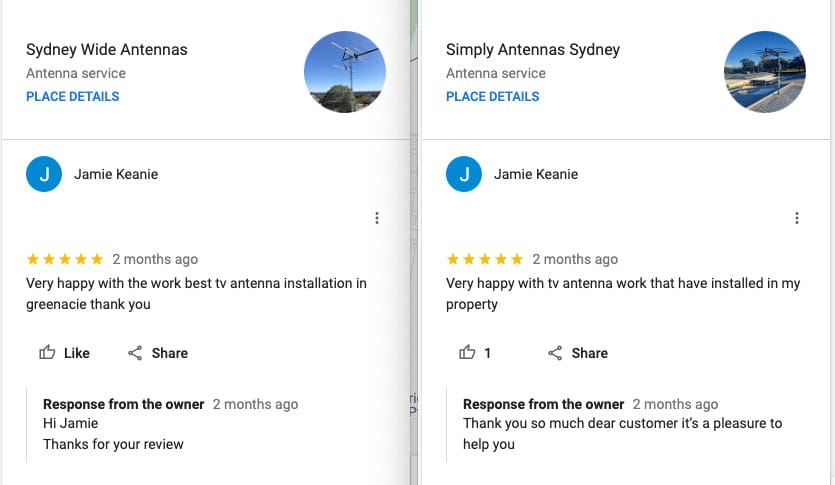Do Searchers Use Pack Results?, LSA Review Abuses, Google's Failed Review Moderation
How often do searchers rely on the Local Pack and Finder to answer their questions? LSA review hijacking abounds and why Google's review moderation is still failing.

How Often Do Searchers Rely on Local Pack Results?

As part of our ongoing local, multi-location research into search behaviors, we experience first hand how much user behavior depends on both the vertical under consideration AND what results Google actually provides on any given query. In analyzing over 3000 searcher considerations across three verticals we have seen users look for their answer in the Local Pack/Finder results 33% of the time. It is only slightly less in the legal vertical at 29%. While in the storage and medical verticals between 37% and 38% consider Local Pack/Finder results when looking for their answer. Averages can, however, be deceptive. Driven by user preferences and Google's choice of layouts, Local Pack utilization can vary dramatically. At least 20% of our searcher panels are self-confirmed ad skeptics often noting that they have little trust in the sponsored results. This even extends to the point of some searchers thinking that Local Pack results are sponsored because Google labels the first listing as sponsored. The actual percentage of ad skeptics is likely even higher since we provide no prompting asking them this question during their searches. Yet when LSAs are present, despite a high degree of stated ad skepticism, users often turn to an LSA Ad for their solution. The reasons for this behavior are not totally clear, perhaps they are drawn by the Google Screened designation, the review stars or the images. Regardless, when LSAs are visible Local Pack use dropped significantly to 18% of considerations while 24% frequented the LSA and another 4% patronized regular ads; a dramatic shift in user behavior.

Our take:
- Overall average utilization of local search results is lower than we would have predicted. LSAs are only one factor lowering Pack utilization in the legal vertical as many localized results for legal queries do not even show Pack results.
- It is important for businesses and their agencies to understand how Google changes search results based on the vertical and user behaviors.
- You should test each likely search phrase on both mobile and the desktop to understand which result types Google is likely to show. Only then can you properly allocate SEO and SEM resources.
LSA Listings Hijack Reviews

Local Service Ads (LSA) certainly attract user attention. Given the Google Guaranteed/Screened designation, the businesses advertising appear to the consumer to be upstanding netizens that have been vetted and approved by Google as reliable local businesses. Just read the reviews (which few people do)! As with much of Google's world, all is not as it seems. Fl Affordable Air Duct Cleaning and Dryer Vent Cleaning (wow that's a mouthful) of Miami appears to have over 2300 reviews. It is however deception. They have managed to hijack the review corpus of a totally different local profile, the Percy Warner Park in Nashville, TN. When you call the number in the ad, and ask you are told that you are speaking with Marketing 770. Obviously not sure where the call is originating. Originally Local Service Ads offered up the promise of avoiding spam via Google's screening and verification process. Google claims that they perform checks of a business' insurance, business registration and background details and note that "one important check in the verification process is making sure that Business Profiles on Google are properly connected to matching Local Services ads". According to LSA expert Crystal Horton Google does not bother to ask for any proof of ownership of the Google Business Profile during LSA setup. Thus you can easily attach any listing to an LSA account. Apparently they only request the "Google Maps link". So much for the "important checks".

Our take:
- With the original promise of Local Service Ads and Google's experience with local abuses, Google had an opportunity to provide consumers with high integrity local listings in high risk categories. Whether due to income pressures, lack of concern or naïveté, Google appears to be failing.
- It seems that LSA spam is fairly widespread. Here is another listing with hijacked reviews in the same vertical and in the same market. Clearly these are not isolated incidences (other examples here, here, here & here).
- Google Ads has announced that it is going to update the Location Ad asset requirements this coming month, requiring that the business running the ads and business profiles match. Not a very high bar yet it remains to be seen whether this will apply to LSAs.
- Given the degree to which Google claims to vet and guarantee these listings one has to wonder whether Section 230 protections apply or whether Google has a legal obligation to make sure that these listings and ads are truthful.
Why Does Google Get Review Moderation Wrong?
Google touts both that it is an AI first company AND how well they protect against fake and malicious review content. And yet they seem to often get review moderation wrong. In the high profile case of an orthopedic surgeon accused of review cheating, first reported in 2020 by renowned review fighter Kay Dean and despite a NYS AG investigation of the Doctor and the practice, reviews were missed by their vaunted AI review algo and were not removed until highlighted by the NY Times a few weeks ago. Perhaps it is too much to expect an AI based filter to always get it right with over "20 million reviews, photos, business hour updates and other contributions" added to Maps each day. After the fact moderation is the key and Google makes claims that their staff are extensively trained to "catch policy-violating content and ultimately keep Google reviews helpful and authentic". The fake review moderation process is still too opaque and even with the knowledge of the process and the escalation privileges I enjoy as a GBP Product Expert it still all too frequently fails in inexplicable ways. For example getting rid of fake LSA reviews is a total crapshoot. Most difficult for me to understand though is the obvious cases laid out in great detail and reported multiple times that they refuse to do anything about. Like this business that gets exactly the same reviews by the same person across multiple locations:

Our take:
- Over the past two years Google has finally started investing in improving their review filters. Their faith in AI, some amount of hubris and poor staff training still means that all too many fake reviews still get through.
- Google contends that the FTC should focus on the buyers and sellers of fake reviews and not the platforms on which the abuses occur. The FTC, in their new rules about reviews, largely agreed with them,
- Until Google and the other major review platforms are held accountable by regulation and law, the problem of fake reviews will persist.
Recent Analysis
- ICYM: Why Citations Ain’t What They Used to Be by David Mihm
- Stay tuned for our upcoming podcast and interview with Joy Hawkins & Darren Shaw on how local agencies are using ChatGPT for Local SEO and agency management.
Short Takes
- The Google Maps app now displays photos with review text and a Place Topic in a prominent carousel at the top of the Profile.
- A good summary of the changing understanding of how the Google ranking algo works based on information released in the Google anti-trust trial.
- This owner thinks that review responses are a great place to get things off their chest and "say it like it is".
- Google is testing an image search result that includes local brand information with the image, making it more valuable for local businesses.
- Use ChatGPT to optimize your content for local search.
- Google enabled LSAs to send leads & receive replies via SMS.
- Missouri attorney general files suit against Dollar General for charging prices that are higher than the advertised prices on shelves.
- People are ditching dating apps to find love on Yelp? (WSJ)
- Google Business Profile (GBP) suspension email now actually provides suspension details.
- The NY Times reported the story of another parent whose accounts and 10 years worth of data were removed from Google because of a "pornographic" video that her 7 year old sons had uploaded, only to be restored after the NY Times investigated.
- Census.gov report: Only 3.8% of Businesses Use AI to Produce Goods and Services.
- If you are a multi-location local business, Google recommends that you follow the existing local business markup guidelines in addition to the new organization markup so that the organization can be shown on Google knowledge panels.
- What Google at peak search means for marketers.
Listen to our latest podcast.

How can we make this better? Email us with suggestions and recommendations.
